Summary of this timeshare case against Marriotts Marbella.
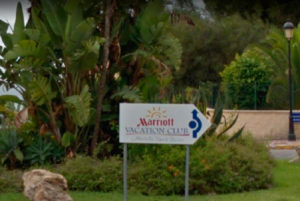
Our client bought a timeshare at the Marriotts Marbella Resort in 2004.
Marriott sold him Timeshare weeks known as “floating” weeks, in other words, without allocating a specific room or set date of arrival each year when using the timeshare.
Also, the timeshare contract was for a duration of more than 50 years, so our client in this case, would have to be paying really high maintenance fees his entire life.
Furthermore, Marriotts Marbella charged him the price of the timeshare within the legal period of time that buyers have to withdraw from the contract, which is prohibited by Law 42/1998 of timeshare.
The client appointed the Law Firm JC Vila and we took the case to court to report all the illegal parts of the Marriotts Marbella timeshare contract to the judge.
The court agreed with us and said that the timeshare contract was not valid, ordering Marriotts Marbella to refund the money paid by the client for the purchase. Marriott will have to refund the money with interest from the time the contract was signed and since that was 14 years ago, this will be a large amount.
Marriotts will not only be required to refund all of the money paid, they will also have to pay our client more in compensation, as required by law they must pay DOUBLE to the client because that is the punishment for not respecting the period of time any buyer has to freely withdraw from the timeshare (not respecting the cooling off period).
You can read or download the court’s decision here and continue reading the details of the case.
Our client was interested in a timeshare at Marriotts Vacation Club de Marbella.
Our client became interested in owning a timeshare at Marriotts Vacation Club de Marbella under false pretences.
This is because the ‘Hotel’ experience is very different to the ‘timeshare ownership’ experience.

As he explained to us, the Marriotts Marbella Hotel is a top quality resort with beautiful apartments and luxurious common areas. It is also by the sea in a privileged area of Marbella.
Marriotts Marbella’s customer service, as a hotel, is also excellent and all those factors led him to ask for information on the advantages of buying a timeshare instead of staying now and again like any other normal tourist or traveller.
The marketing of the timeshare. The presentation (“sales presentation”).

As soon as our client showed an interest in buying the Marriotts Vacation Club timeshare, he was quickly invited to go to a meeting or sales presentation.
These presentations are the key to the timeshare industry.
Timeshare sales procedures consist of a very elaborate strategy, whereby the client’s personal trust is won by taking an interest in their private life, knowing their tastes, talking about supposedly common pastimes, inviting them for a meal or giving them small gifts, and showing them a show flat as an example. The clients are lead to believe that this show flat will be similar to the one given to them during their holiday if they buy a Timeshare. However, they rarely are the same.

The client is first taken to a place that has an atmosphere designed to put the clients at complete ease and to lull them into a false sense of security where they then will listen to long and tiring demonstration sessions with images, videos and fabricated descriptions of the holiday experience. Sometimes they give the clients alcohol to impair their judgement and decision-making abilities before they show them inaccurate financial calculations.
Each resort has its own techniques and maybe the ones described here are not exactly the ones used by Marriotts Marbella when it markets its timeshare weeks.
Some resorts are more aggressive than others in their timeshare marketing scheme, but in general the objective is to deliberately affect the consumer’s ability to think, even to subtly intimidate them by pressuring them to accept, tiring them out and making them feel uncomfortable if, after so many explanations about the system’s benefits, they do not immediately sign the contract.
A perfectly structured “sales team” takes part in the marketing of the timeshare and is made up of several agents each with specific objectives in the process.
There is one to capture the client, another to win their trust, a “team leader,” another who explains the product, another who checks the contractual and administrative details and another one who closes the final deal with the signing of the contract and documents.

The important thing is not to give the timeshare buyer even one minute to think, since if the sales person, the one who won the trust for example by inviting them to have breakfast with his own family, does not get the signature immediately, he is replaced in seconds by a supposed “boss,” who has a different attitude and shames clients for their lack of vision in not buying a service that will definitely make them happy, or by making them feel small for not being able to make this small investment, or suggesting they are foolish because they don’t seem to understand how lucky they are to have the chance to accept this offer, or telling them that it is the last unit for sale and they either get it now or another smarter client will get it in a matter of minutes.
The “free” exchange of timeshare around the world.

One of the supposed benefits of the timeshare system is that, in theory, it is possible to exchange holidays in any other part of the world, with total freedom and practically free of charge.
But this is absolutely not true.
Any timeshare owner who wants to take part in the exchange system and exchange their holiday week have to deposit their timeshare in a common exchange or fund organised by a company (the largest ones are RCI or Interval) so that all participants can share their timeshare and choose the place and week that interests them.
The timeshare owner will have to pay an annual fee to the organiser for permission to take part in the exchange system and each time an exchange is made, they will have to pay an additional fee called an admin fee or booking fee.
But the organiser of the system, for example RCI or Interval, has total control of the weeks deposited and reserves the right to offer the general public whichever ones it wants. In other words, it does not have to offer all the weeks that have been deposited by timeshare owners.
The result is that the organiser reserves for itself the best timeshare weeks in the best seasons and the best destinations and uses them for its own purposes (renting, commitments, etc.) and normal users never have access to them.
The largest organiser of timeshare exchange in the world, RCI, has already been sued in the United States in what is called a “class action” where thousands of clients joined together to claim huge compensation in a collective lawsuit against RCI. You can read about it in this link.
Another problem is that holidays have to be booked a very long time in advance, 13 months to two years, which forces the timeshare client to make long-term plans, which is practically impossible to do.
The timeshare: “easily” get your money back by selling it.
Another common trick that the resort salesperson often tries, is to convince the client that the product or service they purchase is an investment and potentially will go up in value which certainly is a trick or lie because Timeshare products rarely ever go up in value.
The consumer thinks that they can easily get the money invested in the timeshare back, whether this is because there are a large number of people interested in paying for access to this wonderful holiday system, or because the company can buy it back when the time comes.
So, even if the buyer eventually thinks the service is very expensive, they think that as soon as they want to get rid of the timeshare, it will be taken off their hands and they will get the same amount that they paid or more.

The sad reality is that it is worth nothing because no one buys timeshare if very aggressive sales techniques are not used with the potential buyer.
The Hotel or Resort do not buy them back and no one wants them, even for free, because they will see it as a trap and a liability that they do not want.
You just have to look at the internet ads selling all kinds of timeshare at ridiculous prices such as 1 euro or 0.
Timeshare maintenance fees.
The timeshare sales agent never mentions the maintenance fees for the timeshare week they are selling.
At the most, they will talk about small annual payments that are used to cover expenses for use and that go up gradually.
But this will be one of the timeshare owner’s main complaints.

Old Law 42/1998 and current Law 4/2012 on timeshare s set out that the maintenance fees could never rise above the annual consumer price index so that timeshare buyers were protected from abuse by this sector.
But in practice, resorts increase them all they want. They say they do it according to the resort’s needs and to take care of the timeshare, but they actually do it whenever they want without anyone being able to control why they increase so much.
One timeshare week at Marriotts Marbella pays around €1,300 a year in maintenance fees.
It is true that it is a luxury, high quality hotel, but how do we explain that it, in theory, charges 52 x €1,300 = €67,600 a year in maintenance expenses for each flat?
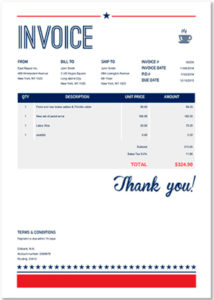
The answer could be that the maintenance fees include expenses for the magnificent common amenities, gardens and swimming pools, but if we multiply this by 300 rooms, we get maintenance expenses of €20,280,000 a year, which is absurd.
In any case, the timeshare client has to pay the maintenance fees whether they want to or not because the law gave hotels the possibility to demand those maintenance fees as if they were community fees for any community of owners residence.
You can see that the timeshare law says in Article 31 that the resort can demand the fees using “the executive procedures that Law 49/1960 of 21st July on Community of Owners allows it to use on the community of property owners to demand the fees for common expenses.”

Even if the timeshare owner thinks they can refuse to pay the maintenance fees if they are higher than the consumer price index, they actually can’t because they would have had to legally challenge the budget that increases the fee by 10% or 20%.
Is any client really going to go to Marbella’s courts to sue Marriotts Marbella so that they lower the fee amount? Or is any client going to travel to the Canary Islands to sue Club Anfi timeshare by challenging the document that approved the budget?

Some timeshare owners think that if they don’t pay the maintenance fees they will lose the timeshare. They think it’s that simple and that to forget about the timeshare, all they have to do is stop paying and they can say goodbye to the problem.
But this is not correct. In fact, it would be a serious mistake to assume this. The resort has the option to take the timeshare back whenever the maintenance fees are not paid but it also has the option to force the client to pay the back maintenance fees by taking the client to court.
Obviously, the maintenance company will always opt to claim the fees in court because it only has to let 3 or 4 years of debt accumulate for it to be worthwhile to sue the timeshare owner for not paying the fees and it will win the claim if the fees were not legally challenged years earlier.
This is where the timeshare owner will realise that they have fallen into a nasty trap because, as we have said, they can’t sell the Timeshare, cancel it or get rid of it so the timeshare is theirs for life and will also become the responsibility of their heirs and executors after death, as we explain below.
Also as time passes and the building gets older, more has to be spent on maintaining it by spreading the fees among all the timeshare owners.

Then, the icing on the cake is that if the maintenance budget for a single room is divided by 52 weeks, what happens if 20 timeshare owners stop paying because some have died, others have gone to a different country and can’t be found and others have filed a legal claim that has canceled their timeshare contract?
Obviously, the maintenance budget for the flat will go up because now it will have to be split between the remaining 32 timeshare owners instead of the original 52.
That is what has happened with our client now that he has won his case against Marriotts Marbella. There are now no longer 52 owners paying, there is now 51 because our client’s timeshare contract has been cancelled.
The duration of the timeshare.
When the timeshare sales agent markets or pitches the timeshare, he or she does not warn the purchaser that they will own the timeshare for life. This is the case when the vendor follows the law and offers the maximum legal duration of 50 years, but it is also the case for other limited periods of time.

And in the best case scenario, if the timeshare buyer purchases it knowing that it is forever, they do so wrongly believing that they can resell their timeshare week whenever they want, or cancel it by talking to the hotel or resort, or that by stopping payment of the maintenance fees, they can get rid of the timeshare.
None of those things will happen: we have already said that the timeshare can’t be resold because nobody will want to buy it and the timeshare owner will not be able to ask the hotel or resort to cancel it because the hotel or resort does not want to stop receiving the high maintenance fees, which are lucrative to the resort, and the timeshare owner can’t stop paying the maintenance fees because they would be sued in court. So, in short, the timeshare owner is trapped.
Trapped because they have a timeshare that 4 or 5 years after they bought it, they no longer want, enjoy or are interested in, but they have to keep paying the maintenance fees that keep going up for life.
And the worst part of all of this is that once the timeshare owner has come to terms with this trap, they then hear the rumour that the responsibility and the annual maintenance fees will be passed onto their heirs when they are dead. Could this be right?

The timeshare, like any other property or right, will eventually belong to the person who inherits or receives the dead person’s estate.
And we all know that an heir cannot choose a part of the inherited estate and turn down a part that they do not want. It’s all or nothing.
A different matter is whether it is practical or appropriate for the resort to demand maintenance fees from a timeshare owner’s children, but we have documents of specific cases where the owner is expressly warned that their heirs will take on the obligation to continue paying for the timeshare.
The section we include below is from a letter sent to another client of ours by a large timeshare chain (NOT Marriott).

The timeshare system: fixed, floating, by points, fractional.
Marriotts Marbella sold our clients a timeshare in the system they call “floating” weeks.

With the fixed week system, the owner can use the timeshare on a certain week of the year in a specific flat in the building. With this timeshare system, the owner knows exactly which day their timeshare holiday starts and exactly which day it ends, as well as the room they are in and it does not change.
So, the client does not even need to book a timeshare week because as the timeshare owner he/she already has it assigned to them until the end of their contract, whether they use it or not.
They may come to an agreement with the hotel to change the date or the room, or to let the hotel rent it for the year the timeshare owner does not use it. But, in principle, the week they bought is the one they can use.
But with the ‘floating week’ timeshare system that are sold by Marriott Marbella, that they call “gold weeks,” and “platinum weeks,” etc. are a week’s stay without an assigned week of the year or an assigned apartment. Therefore each year, the owner of these floating weeks must contact the hotel reservation desk and it is the hotel that decides which week the client will have for their holiday and in which room they will stay.

With the ‘floating week’ system, the client can’t choose the holiday week or room in which they will stay, but depending on the colour of the timeshare they bought “gold week,” and “platinum week,” etc, the client can stay there in high, low or mid-season.
Everyone usually prefers high season, but what they don’t know is that high season can last a long time, from June to September, or longer.
So, when the client books their holiday when the own a ‘floating week’ timeshare, the hotel can take the booking on any week within those 4 months of summer and the client can’t complain because the system is a ‘floating week’ timeshare and not a ‘fixed week’ timeshare.
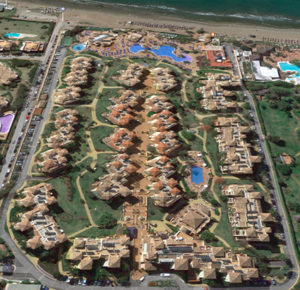
The problem arises when the client can only travel in July because of when their children’s summer school holidays fall, but Marriotts Marbella only offers them the first week in June for example. Or when it only offers them the third week in September, but the timeshare owner has to work during that month.
The ”floating weeks” timeshare system has great benefits for Marriotts Marbella because it means that Marriotts can offer the clients (owners of the ‘floating weeks’) the weeks that are convenient to Marriotts (not to the client) and allows the hotel to keep the best weeks, the true high season weeks for them to offer to the paying public and the timeshare owners are left with the less desirable weeks (outside of school holidays etc).
As anyone can see from booking.com for example, are operating as a hotel as well as a timeshare resort and they want to keep the best rooms and weeks for the paying public and timeshare owners within their resort are left with less popular weeks at less popular times of the year.

Logically, it is much more profitable for a hotel to take private clients during high season at the regular rate than timeshare owners who don’t pay anything because they have already signed the contract many years earlier.
In other words: if the client paid Marriotts Marbella for the whole timeshare in 2004, it would be more beneficial to the resort to restrict when the client stays to June or September and to leave the high season months of July and August for private clients who pay cash.
The “floating” timeshare system is absolutely illegal in Spain and the contract that the client signed is not valid. See this Decision made by the judge of the Session of the Civil Division of the High Court declaring the cancellation of these types of contracts.
And if you still have any questions, see the comments or the summary made online on the website of the Judicial Branch, a department of the Justice Ministry.
The other two timeshare models that there are in the timeshare industry are the ‘points’ system and the ‘fractional rights’ system, and both are also illegal and the contracts are not valid.
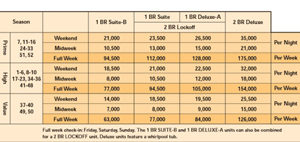
When a client purchases ‘A Points Timeshare’ they receive a number of points that they can “spend” each year to book a stay at the hotel on their preferred dates. However, depending on the dates they choose, it will “cost” them more or fewer points, and if they don’t have the number of points that they need, they can buy more points and add them to the ones they have.
The ‘fractional timeshare’ system is another invention of the resorts and Timeshare salespeople, that was invented before they came up with the ‘floating week system’. The idea of the ‘fractional timeshare’ was to convince the buyer to pay astronomical amounts of money by getting them to pay several payments during the year because, as well as the week they stay at the hotel, they supposedly buy a “fractional” portion of the apartment. Then, the promise is that, when they decide to sell their ‘fractional timeshare, they will get their money back or turn a profit but we all know now that that is not true, is fraudulent selling.
In practice, it is impossible to sell an apartment that was previously sold to many owners as a ‘fractional timeshare’ because it requires the unanimous vote of all the timeshare co-owners and the price has to be agreed upon which will be difficult if not impossible. The resort will also be a co-owner which will give them the power to prevent the sale and they will obviously prefer not to sell something that gives them the benefit of receiving the high maintenance fees each year.
The Timeshare pitch.

The client is never given any time between explaining what the timeshare is (the Sales Pitch) and when the contract is signed (no cooling off period). They subject the client to several hours of “brainwashing,” followed immediately by the signing of the contract without being able to think about what they have been listening to or being able to think over the extremely important financial commitment that the client is going to make.
At the end of the sales meeting, normally lasting several hours, the consumer signs the timeshare contract that is put in front of them without even reading it. They just want it to be over and be able to leave, so with the same trust that brought them to the “presentation,” they sign a binding contract, thinking that it includes the verbal promises that they have been given are included in the contract, in writing.
What’s more, the rough draft documents and the timeshare contract are read to them by a supposed “sales agent/administrative employee” who who only reads out the positive parts (keeping up with the illusion that has been created) and they do not read the negative parts (the parts that might put the client off signing).
The client signs it, agrees to pay or finance the price of the purchased timeshare and returns home in debt to the tune of hundreds of thousands of euros, without reading anything that they signed before signing it.

Ultimately, it would be a serious mistake to underestimate the selling power of these tested marketing systems and to believe that only “foolish people” can fall for these traps or setups and end up buying the services that are laid out in these contracts which are deliberately written to be incomprehensible.
We insist that not even the smartest person would find it easy to escape from a timeshare presentation that takes 4 to 6 hours and includes videos, idyllic images and fantastic marketing projections, where they compare the sad life that the client had led until they arrived at the resort, faced with the prospect of a wonderful future at a modest cost that can always, always be recovered when they sell it.
The final golden rule of the “sales presentation” in the timeshare sale is that what is offered “verbally” is not the same as with the Timeshare contact and documents that the client is made to sign, who has no real time to read them any way (and they would not understand them even if they did).
Reality hits! The client slowly realises what impact the ‘Timeshare contract’ will have on them.

After signing the contract, over time, as and when the buyer tries to use the timeshare, the problems start to crop up. They of course, complain to the resort and receive a negative response to their complaints and to their requests. Eventually, they discover that the resort is always right, according to the written contract (which is quite different from what was promised verbally), and what they have bought is actually nothing like what they were lead to believe they were buying.
For example, Marriotts Marbella told the client that the Timeshare’s maintenance fees would only rise in line with the consumer price index but the contract literally says that the maintenance fees may also increase in line with how the resort “consider to be necessary or desirable in order to meet the resort’s needs.”
When the client bought the timeshare, Marriotts Marbella assured him that he could resell it at any time, even back to the hotel itself, and get all the money back, but the contract only says that Marriotts Marbella “has the intention to set up a resale programme…” and that “this programme does not guarantee that the owner can resell their rights through this programme.”

In the Marriotts Marbella timeshare sales process, the sales manager verbally assured the client that he will always be able to stay at the Marriotts Hotel in Marbella, but he later found out that the contract says that “they do not guarantee that the owner taking part in the Holiday Ownership Marriott Rewards Programme can stay at a specific hotel during a specific period.”
When he bought the timeshare, they told the buyer that he could always stay at the Marriotts Marbella any week in the season he purchased, but the contract says that “high demand for Marriott hotels included in the programme can mean that there is no availability of periods during certain seasons.”
With the contract that Marriotts Marbella uses, they gave themselves the possibility to “add, change and/or remove the terms and conditions of the Marriott Rewards programme”. In other words, they can change their mind when they like.
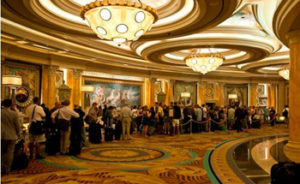
Also, no less importantly, if the client wishes to make good use of the timeshare, it is necessary to book their holiday a minimum of 13 months in advance of the date they want to be there because if not they would seriously run the risk that, if they did it any later, Marriotts Marbella would deny the right to use the timeshare week.
You might find this time scale hard to believe or think that there is some exaggeration, because it is hard to believe that when a client has paid so much money for a holiday product or Timeshare week like this that the resort does not provide a better service and some sort of guarantee that the timeshare owner will definitely not be left without a holiday. It is unbelievable, but read the apartment Booking Guide (below), that Marriotts Marbella Beach Resort gives its clients. It clearly shows that this is the way Marriotts behave.

The Marriotts Marbella timeshare client asked us for our help.
When the timeshare owner discovered that:
– he could not sell it because it’s worth nothing and nobody wants to buy a Timeshare.
– he couldn’t cancel the timeshare or give it back to the resort because they don’t want it either.
– his ownership was for life.
– his children or heirs live with the worry that they too could be chained to the timeshare.
– the maintenance fees of his timeshare keep increasing.
– he has to book 13 or more months in advance to use his week.
– Marriotts Marbella never gave him the dates that he wanted, instead, they only offered him the ones that suited the resort or hotel reception.
– when he was given a room, it was not anything like the showroom he was shown when he bought the timeshare, but was just whatever was available, so almost always an inferior room.
– on one occasion he was denied the right to stay at the Marriotts in Marbella, instead was forced to accept a different Marriott’s resort because of overbooking.
– all private or direct clients paid less to stay for one week than it cost him in annual maintenance fees.
– when he wanted to exchange to stay at another resort, he had to pay an additional fee and they never have the week that he wanted available at the destination he wanted.

At that point he decided to come to our office and showed us his timeshare contract. We checked and found that Law 42/1998 on timeshare or Law 4/2012 also on timeshare had not been respected at all.
Article 1.7 of that Law sets out very clearly that these types of contracts are not valid, so there can be no talk of the statute of limitations or that over time the situation cannot change.
We then informed the owner of the timeshare that he could legally sue Marriotts and what were his legal rights.
We then informed him of the various courses of legal action that we could take against Marriotts Marbella in order to exercise his rights. We also informed him of what requests (in the form of a claim) we could make with the courts to force Marriotts Marbella to do as the law states.
Having said that, our client asked us and needed to know how much it would cost him to legally cancel his timeshare.

The Law Firm JC Vila offers “no win no fee” with no up front fees for the cancellation of some (but not all), timeshare contracts.
It’s as simple as, if we win the case and the client is refunded the money from the timeshare, we charge a fee and if the client loses the case and the resort does not refund his money, we don’t charge anything.
We charge a percentage of the money recovered by the client and we only charge in the event of success.
If the client accepts our proposal, we will put it in writing, sign a contract and start their defence (claim).
CLAIM AND THE JUDGES AWARD
With this specific case, we sued Marriotts Marbella in court to have the Timeshare contract legally cancelled.
As we were certain that the agreements were not valid, we asked the court to order Marriotts Marbella Beach Resort to refund our client all the money he paid to purchase the timeshare week.
Also, as Marriotts Marbella should never have prepared illegal and invalid timeshare contracts, we also asked the court to order the Marrotts to pay our client the legal interest from when he paid the money which was almost 14 years earlier so Mariotts were ordered to pay many thousands of euros in interest.

And finally, we forced Marriotts Marbella (through the courts) to refund double the money paid by the client when he purchased the timeshare on the grounds that he was not given a period of time to think about or withdraw before he was charged an amount. On the contrary, Mariotts convinced him to pay without giving him time to study the contract and learn about all his rights.
The reason for this last request is that the timeshare law says that, before the consumer makes any payment to purchase the timeshare, they must receive all the relevant legal information.
So, if Marriotts Marbella did not give him all the information set out by the law, they should not have charged him any amount until enough time had passed to allow the consumer to find out more information and withdraw from the contract if they want to.
But Marriotts Marbella preferred, as all resorts do, to guarantee the payment as quickly as possible and forced the client to pay it for the timeshare immediately because, once paid, the client thinks it’s really complicated to withdraw and get their money back.
The legal consequence of this behaviour is to force the resort to refund DOUBLE the money it received.
The decision by Marbella Court was what our claim asked for and agreed with us, and you can confirm it by downloading or reading it at this link below.
And remember that if you have a similar problem with a timeshare, you can call us or contact us and maybe we can help you as we helped these clients of Marriotts Marbella.

